European Disability Network: “God is able, He does not disable us”
The network of Christian ministries working for the inclusion of people with disabilities celebrated its tenth European gathering in Riga (Latvia) with the participation of 12 countries.
RIGA · 07 MAY 2018 · 15:37 CET
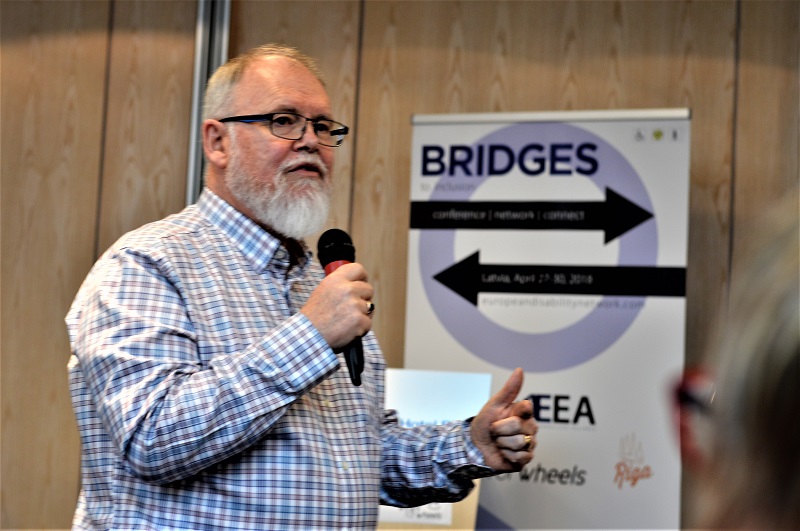
One Sunday, in a church that could be any of ours, two women came in and went to sit in the front row. They told the person in charge of the reception service that one of them was deaf and, the other, her interpreter.
Most service attendees were fascinated how both women communicated, through sign language, during the time of worship. Even the pastor who preached that day, was somewhat distracted by the situation. His sermon ended up lasting half of the usual time and he even articulated better than ever. That day, many church members came out saying that they had understood the message much better than on other occasions and that they wish these women would repeat visits. That is, the disability of a person (sensory disability, in this case) eventually led to an adaptation by the church that benefited everyone. This story is told by Tony Phelps-Jones (Christian Prospects ministry) and serves to highlight the idea that no one can consider others as less necessary and that every church should be inclusive.
In this spirit, the European network of Christian ministries working with people with disabilities (European Disability Network) held its tenth continental conference last week, with the motto Bridges to inclusion in Riga (Latvia), a city that combines a splendid modernism with the decadent architectural charm of the Soviet heritage.
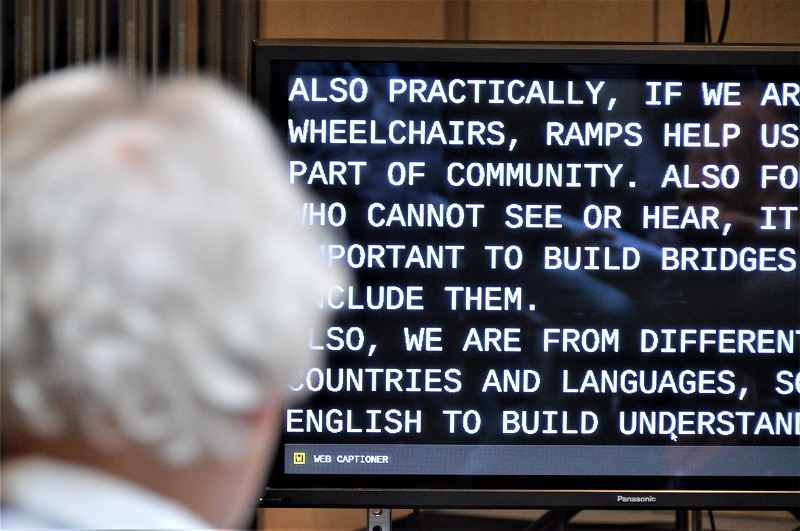
Previous meetings had taken place in Switzerland (2001), Hungary (2002), Albania (2003), Spain (2004, although in this case it was only a meeting between representatives of Spain and Portugal in Terrassa, Barcelona), England (2006), Ukraine (2009), Germany (2012) and Austria (2015).
This year’s gathering brought together some 50 people from up to 12 countries (Latvia, Switzerland, United Kingdom, Kuwait, Germany, Hungary, Belgium, Lithuania, Italy, Ukraine, Norway and Spain) during four days that served to share resources, experiences, projects, blessings and develop new challenges.
We must take into account that in Europe almost 100 million people have some kind of disability (physical, sensory or intellectual / learning), but we still find deficits in our churches about how to integrate, adapt and, especially, include, although it is also a encouragement to see the work being developed by different Christian organizations in each of the countries involved.
Thus, the main aim of the meeting in Riga was to strengthen visions within a continent that has different cultural and social environments, bearing in mind that these bridges seamlessly connect people with and without disabilities. After all, that’s a conventionalism created by man to “classify”, but to which God does not pay much attention. Fortunately, we are all different.
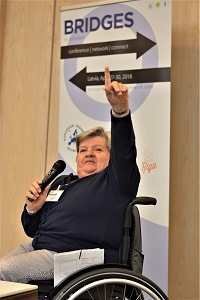
Detailing the content of the meeting is complex, so we will try to summarize some of the participations, which were made in a 100% pedagogical environment, with simple and affordable adaptations that can serve as a reference for churches when we talk about being sensitive to different needs: songbooks printed with letters of size 14 and 30; wide space to accommodate people with wheelchairs; verbally describe the photos that are projected, and somebody writing on screen what the speaker is explaining.
MARTINA KÖNINGER. Perspective Forum Behinderung, the Disability Forum, of the Evangelical Alliance in Germany: “God is who gives us the correct picture of who we are and how we are”.
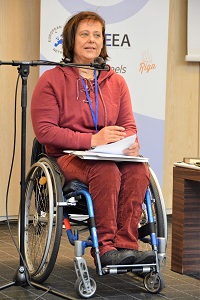
INETA LANDSDOWNE. Twenty years as a missionary with Youth with a Mission in Latvia: “Broken relationships need time to heal”
Ineta has worked for several years in Southeast Asia (in countries such as Thailand and Singapore) and currently lives in her native Latvia. She has worked on several community projects with refugees and displaced people in war zones. “I've learned a lot”, she says, “about human resilience, about courage, hope and forgiveness, but I've also seen a world where we're better at building walls than bridges”.
She explains that “good relationships are not built in a few steps and broken relationships need time to heal”. In fact, she asks about if time heals everything, a question that she doubts about it because “we all need healing and restoration”.
Riga has four major bridges over the Daugava River, a good example of how to establish links, but it also talks about a bridge like the one that was destroyed in Mostar, Bosnia, during the Balkan War (90s of the 20th century), a bridge that was reconstructed and that today “is a symbol of inclusion and of building relationships, but also of memory and pain”. Ineta spoke about the theology of the reconciliation and identity of an author like Miroslav Volf. She also explained the story of his grandmother, who experienced herself the devastation during two world wars and with the Soviet occupation, with deportation to Siberia included, a hard work for her to forgive. Another example is in Riga, “where there is currently only one Jewish synagogue, while before the Second World War there were more than 60”. She speaks of a reconciliation that must be based “on memory, forgiveness, repentance, restoration and embrace”. It is easy to explain, but hard to apply.
PETE WINMILL. Count Everyone In, United Kingdom: “If we are not all in the church, we lose part of what God has given us”.
Winmill's speech was one of the most inspiring about the need for an inclusive society and church with people with disabilities. More than words was the title of his presentation, with a speech focused on the fact that “the world is words, but what happens when there are people who do not understand them or do not hear them? We think that everyone understands what we explain, but there are those who need help”.
Winmill explains the situation of people who “are afraid of how to treat people with learning disabilities”. But “we all have different origins, cultures and capabilities. We are all created in the image of God, as explained in Genesis, and we are all different, as we read in 1 Corinthians”. Winmill challenges us to put ourselves against the mirror and look what we see: “We are different and made in a wonderful way, we give meaning to what God is. But what about the disability? Are we talking about different people? No! Are we talking about being less human? Do not!”.
The challenge for people with learning disabilities, Winmill detailed with passion, is to overcome some barriers about learning, communicating, dealing with day-to-day aspects. And another challenge is to overcome myths in society, to get most people understand, for example, that “a dyslexia or mental disorder does not mean learning disability”. The same is true for autism, a disorder not always linked to learning disability.
And what can we do from the churches? What simple tips can we take into account? Pete says that they can be summarized in affordable questions such as “explain; do not take anything for granted; respect the spaces of everyone; do not abuse the evangelical slang that can sound like a foreign language and keep in mind that two of every three people with learning disabilities can’t read in a projection”. Among the tips he proposes, there are some related to sermons or hymns that can benefit everyone to better understand (whether people with or without disabilities, such as the case of the deaf lady at the beginning of the article): “Include some songs with a simple letter; explain the meaning of that hymn; be concise in the preaching and, in the end, make a small summary with two or three very clear sentences”.
And the best conclusion: “We all have gifts. If we are not all in the church, we lose part of what God has given us”.
SERGII AND NATALIA BOLCHUK. Founders in Ukraine of the Agape Rehabilitation Complex center for people with physical disabilities: “God loves and cares for all equally”
Natalia, 17 years ago, broke her neck in a car accident and her body was paralyzed. She tells herself that she went through “very hard times and depression”, but that she managed to “heal the soul through prayer” and with the example of words “of courage” like those that Paul wrote to the Romans. Her husband, Sergii, adds that this accident, which was destined to have a negative future, ended up becoming “a stimulus, a project to start working with people with disabilities in Ukraine”, a country with few resources for them. The Agape center was built over four years and is a reality since 2016 in the town of Boratin, where people with impaired motor functions are treated. The center has 14 rooms (28 places) for people who can spend at least one month for their rehabilitation process.
The aim is to improve their mobility and increase their level of autonomy, with the work of therapists, speech therapists, psychologists, nurses and other professionals, but also with an offer that ranges from summer camps to family retreats, without forgetting the most important thing: “We work from Christian values, because we believe that God loves and cares for all equally”.
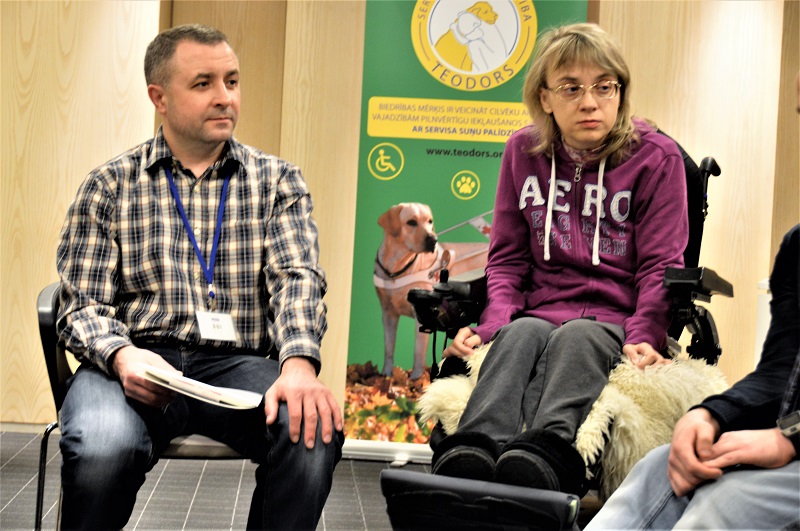
TIBOR MIKLOS. Bartimeus Foundation in Hungary, with people with blindness and sight loss.
Miklos, with blindness, wonders if anyone with a disability can enjoy life and if he can have a purpose in life. The answer is more than obvious, of course. In fact, Miklos proposes a play on two words (God and Disabled). If we read them fast in a row we can get to the phrase God is able. One of the recent projects he has collaborated in is the distribution of audiobooks (with the support of the British ministry Torch Trust) for blind people throughout Hungary, which has led him to contact people who were reluctant to the Word of God and with others of the gypsy community who usually suffer a double rejection. Torch, in fact, also distributes other material (such as literature in Braille or large print) in a hundred countries, especially thinking of those areas with fewer resources. Only one fact, but very significant: 90% of people with low vision of the world live in developing countries.
KASPARS APINIS. Wings for Wheels and Youth with a Mission-Riga: “Christianity is relationship, not religion”
“We can see things in different ways”, says Apinis, “but we do not know if we're right”. His reflection is based on the idea that some people may have about Jesus, about whether he was a mystic or someone who did things without meaning. “All that does not matter, it does not matter what we think about him, because he touches the whole world. Christianity is not a religion, it is a relationship”, and that should be the basis of our role as people with or without disabilities towards other people with or without disabilities.
GORDON TEMPLE. Torch Trust in the United Kingdom, Christian organization that works to improve the conditions of people with sight loss; and Churches for All, British network of Christian entities that work with people with disabilities: “God does not believe in barriers”
Gordon Temple is a reference in Christian work with people with disabilities. His book Enabling Churches maybe is the best manual available to understand the biblical perspective on disability and to apply these principles to the daily life of the churches. He himself explains that “God does not believe in barriers or differences that we establish as humans”.
Churches for All focuses its work on facilitating a theological understanding of disability, providing accessible resources and assisting in the development of inclusive initiatives for churches. And from Torch, Temple explains that the work is based “on helping people with blindness or sigh loss to lead a life as complete as possible and to be able to offer their gifts in their communities”.
Only in the United Kingdom is it estimated that there are 4 million people with low vision, people who usually have problems of loneliness, of labor difficulty (only 25% are working) and support (only 17% explain having received some type of emotional support after receiving the diagnosis).
One of the many projects that are part of Torch Trust is a holiday centre in the area of West Sussec, in the South of England. It can accommodate twenty-eight people, and its service is based on “Christian care, prayer and spirituality”.
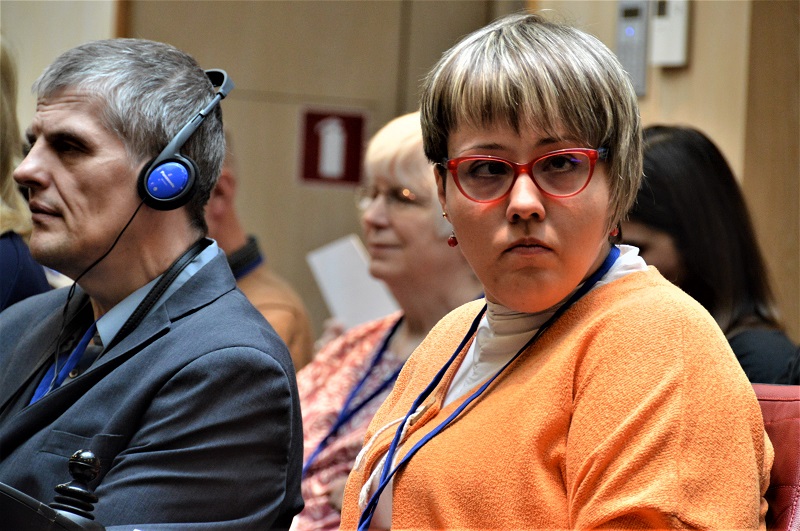
For further information about some of these ministries, follow these links:
Wings For Wheels / Wings For Wheels YWAM (Facebook)
Torch Trust UK / Torch Trust UK (Facebook)
Gemeente en Gehandicapten Belgium
European Disability Ministries (with information about entities in 20 countries)
More photos of the 2018 European Disability Network gathering in Riga, Latvia
Published in: Evangelical Focus - europe - European Disability Network: “God is able, He does not disable us”
